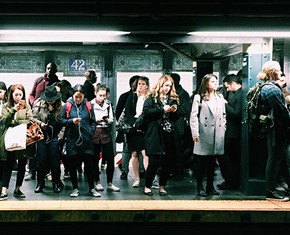The views expressed in our content reflect individual perspectives and do not represent the authoritative views of the Baha'i Faith.
The most important principle of divine philosophy is the oneness of the world of humanity, the unity of mankind, the bond conjoining East and West, the tie of love which blends human hearts. Therefore it is our duty to put forth our greatest efforts and summon all our energies in order that the bonds of unity and accord may be established among mankind. – Abdu’l-Baha, Foundations of World Unity, p. 50.
How does the global community look to you? From your perspective, do we have one? What could we do to enlarge and enhance it?
In the comments section for this article, I’d like to try something new here at BahaiTeachings, by asking you readers to share what the global community looks like from your own individual perspective. I hope the following considerations stimulate your thinking and help you better find the words that capture what’s on your mind:
O well-beloved ones! The tabernacle of unity hath been raised; regard ye not one another as strangers. – Baha’u’llah, The Tabernacle of Unity, p. 9.
For many decades now, the destiny of the human race has grown increasingly clear, as the world has contracted into a neighborhood. We’re becoming a global community. By that we I mean all of us; not just people who read sophisticated magazines, not just people who can afford airline tickets, not just people who work in importing and exporting. All of us, rich, poor, urban, rural, educated, under-educated, everybody. Isolation has increasingly become impossible. What happens in one corner of the world inevitably affects everywhere else, and vice versa. While we have seen glimmers of this process for centuries, the last three decades have witnessed an unprecedented exchange of people, products, trade, culture, and ideas across national borders, continents, and oceans.
Of course, the individual existence of every one of us remains fundamentally local. This isn’t just a relic from a disappearing time—it’s simply part of being human. None of us have ever been in the world as a whole. Each of us always occupies one tiny portion of the earth at any given time. I’ve lived in a lot of places through the years. But the portion of any one of those locations that I know really well remains extremely small; just a handful of streets and buildings and the people I would find there. So to some, it might seem artificial and arbitrary to think of ourselves as belonging to a global community. It may feel more natural to feel like we belong to the local, regional, or national communities we’re already comfortable with.
 But in reality, these existing communities are just as much a product of human imagination as a global community. For example, if somebody dropped me off in Seattle, USA, I would be just as lost if I was dropped in Dublin, Ireland. However in Seattle I would feel an affinity with my surroundings because I know it’s American. If I’m in Dublin, anything I experience that doesn’t seem American might make me feel like a foreigner. Both cities are very, very similar in so many ways. After all, they’re both English-speaking. But our sense of belonging can create very different ways of situating ourselves within them.
But in reality, these existing communities are just as much a product of human imagination as a global community. For example, if somebody dropped me off in Seattle, USA, I would be just as lost if I was dropped in Dublin, Ireland. However in Seattle I would feel an affinity with my surroundings because I know it’s American. If I’m in Dublin, anything I experience that doesn’t seem American might make me feel like a foreigner. Both cities are very, very similar in so many ways. After all, they’re both English-speaking. But our sense of belonging can create very different ways of situating ourselves within them.
If or when the peoples of the world start to feel a strong sense of belonging to a global community, I suspect, it won’t be because they’ve become familiar with the entire human race. Even when we do encounter something new and unusual, we could imagine it as part of the internal diversity of our home society. Just like me going to Seattle, people can encounter people and places from far flung continents, and still feel that they are among their compatriots. We’re all human beings, after all.
It’s possible to think of global unification in objective ways. We can talk about international governance, trade agreements, a universal language, and other things. But another important way to examine it is in the subjective dimension. A global community is not just a governmental structure. It is an experience all the peoples of the world have, within themselves, regarding their wider social environment. Do we think of ourselves as citizens of the world?
With that in mind, I would love to have a conversation that could draw out people’s perceptions of the emerging global community. In particular I’m interested to hear your impressions of those parts of the world that are “foreign” to you, according to the current world order based on nations, but would be considered “domestic” within a globalized society.
We’re all intimately knowledgeable about the small portion of the world we occupy day-to-day. But how do we imagine the world beyond our doorstep, and the masses of humanity that live there? What ideas and pictures pop into your heads? Do you think about how much wealthier everybody else seems to be? Do you imagine a sea of starving faces? Are the faraway nations of the world filled with friends we just haven’t met yet? Or are they foreign, frightening, dens of immorality and corruption? As we advance towards the unification of all the earth’s peoples into one global community, these questions take on a deeper importance.
With that thought in mind, I’d like to turn the space over to you, the reader. In the comments section, share with everybody what the global community looks like to you from your corner of the world.
















Comments
Sign in or create an account
Continue with Googleor